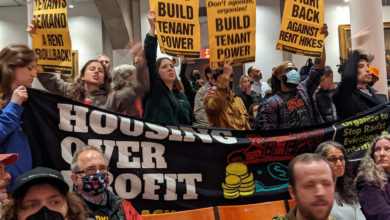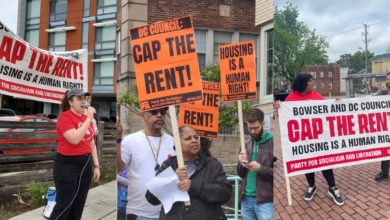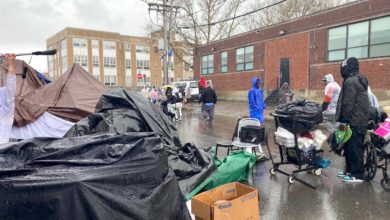Feature image: Hundreds of people march in downtown Spokane. April 25, in an action organized by Humanizing Spokane, demanding tenant protections, public facilities, and an end to single-family zoning. Photo: Humanizing Spokane. Used with permission.
Liberation News directly investigated the homelessness crisis in Spokane, Wash., the second largest city in the state. Underlying the crisis is the fundamental mismatch between the cost of housing and the income of workers at the lower end of the pay scale. Combine any kind of personal crisis such as job loss, prolonged unemployment, mental illness or domestic abuse, and people lose their homes and join the ranks of the homeless.
Washington state saw the third-largest increase in the United States in the number of people experiencing homelessness between 2019 and 2020, according to a new report to Congress. (Seattle Times) This includes a 20% jump in homeless families. These figures do not cover the period since the start of the COVID-19 pandemic in which the number of people living outside in tents visibly grew. In Seattle, researchers documented a 50% increase in tents since the start of the pandemic (Seattle Times). King County, which includes Seattle, has a documented homeless population of nearly 12,000, the third highest in the United States. This increase parallels the rate of increase in housing costs.
“People are seeing a lot more families in encampments, in cars,” said Derrick Belgarde, deputy director of Chief Seattle Club. “And there’s a lack of resources for that.”
Belgarde said that finding didn’t come as much of a surprise given the economic pressures on low-income families.
“Everybody brags about the Northwest, Seattle, having all these big companies, from Amazon to Microsoft,” Belgarde said. “But it pushes everybody out. There’s no chance you can make it on minimum wage.”
Seattle Times
Voices from the streets of Spokane
Riley James Leno is a transgender man who grew up being off and on the streets. He is now also an activist and works in the homeless services field, specializing in helping homeless women and vulnerable LGBTQ community members.
“Major causes of homelessness in the area — the people on the street usually have disabilities and major trauma. Shelter is always full and the average age is 55 or older. [They] can’t afford anything on SSI even if they are one of the few who actually qualify. Violence is especially common in the women and queer population, constant exposure to trauma and that’s what you begin to see as normal.”
Rachel, in her late 30s, became homeless in King County in 2010 and came to Spokane the summer of 2019 because of the promise of opportunity. As of March 2021, no lasting opportunities have been found.
“I used to have a home. I used to have a life. I left an abusive marriage with my daughters 15 years ago and soon after that the recession hit. I lost my job and didn’t have anybody to turn to for help, so we got evicted. After about two months of sleeping in our car, CPS was called and my babies were put into the system. They were 6 and 8. Because I didn’t have access to a shower or hygiene products, I couldn’t get a job; and without a job, I couldn’t get an apartment; and without an apartment, I couldn’t see my children. I no longer know where they are or if they are okay. I haven’t seen them in maybe 8 years now. I just needed help back up, but instead the state took everything I held dear to me.”
Mike Cioffi is a Spokane area activist who also works for local charities. He told us:
“Where did it start? Military vets with serious mental health issues. Trauma in general, regardless of individual’s personality. Trouble processing things and struggling to get over things — could lead to drug use as a crutch. You feel like you aren’t good enough. Society has disregarded them; they are no longer a part of the capitalist machine.”
“John” did not want to give his real name:
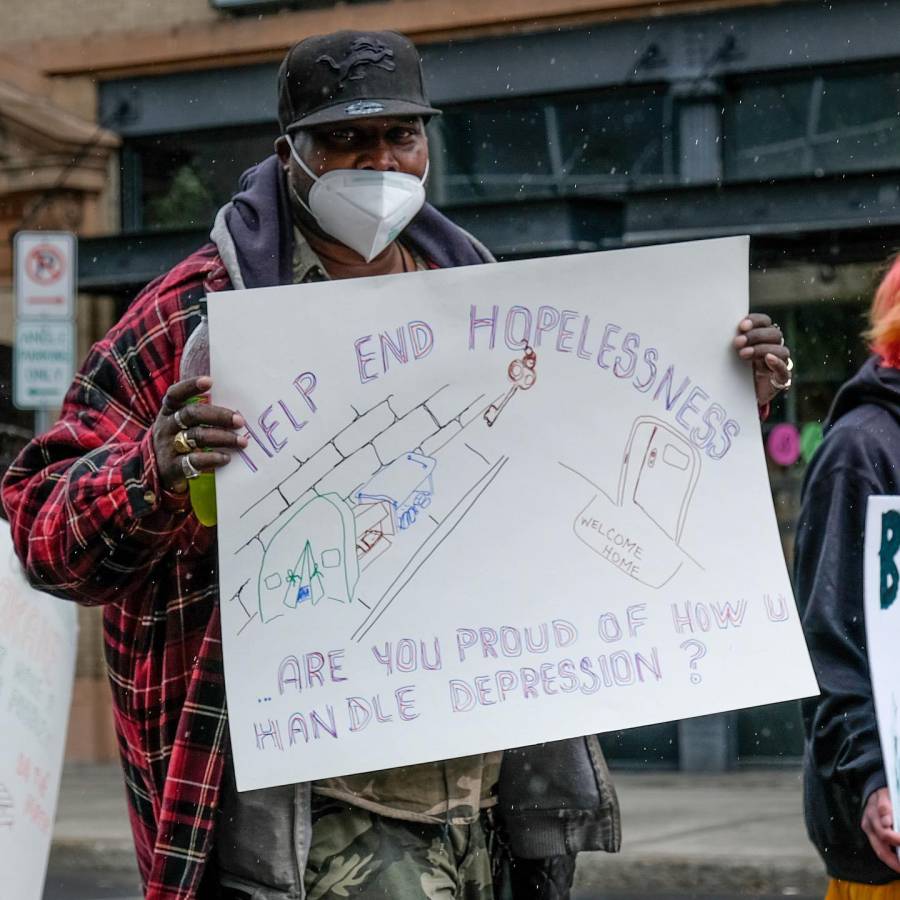
“I’ve been homeless for about three years now. I served in the Army for seven years and was deployed to Iraq twice and Afghanistan once. I saw my best friend killed and other shit I don’t want to even talk about. When I came home for good and retired, there was no benefits or help for me to fall back on, and the VA kept refusing to treat my severe PTSD. I started turning to drugs and blew through my savings in only a short time, and now here I am.”
Fighting for long-term solutions and immediate mitigation
The only long-term solution to the problem of people living in the streets is to make housing a right, not a commodity for the profit of landlords. That said, homeless people and advocates fight in the day to day for things that will have an immediate impact on their lives.
Mike Cioffi explained that there should be no crisis controls or crisis interventions that involve the police. He emphasized that anything with homeless people goes through the police first and always turns out worse than it would with counselors or doctors.
Cioffi also articulated the need for donations of key personal supplies: socks, gloves, hats, coats, underwear and hygiene products like deodorant, toothpaste, soap, sanitizer, etc. People living on the street need blankets, tents, sleeping bags, [that are] packable, moveable. These items are especially needed because police, during routine police sweeps of popular locations, give five minutes to move or they start tossing items in the dump truck, Cioffi explained.
Adding to the needs list of simple items that would be appreciated by many, Leno mentioned: can openers, small utensils and other tools for eating and cooking; tea candles for cooking, wet wipes, condoms, Post-it notes and Fentanyl testing strips.
He also mentioned donating gift cards toward fast food so people can get a meal and also use the restroom as a paying customer.
Cioffi addressed the myth of the panhandler: “People need cash! We live in a society that cannot do anything without cash.”
Housing, health care and the right to live with dignity are human rights
The takeaways from our investigation are clear: Working-class people are just one crisis away from homelessness. The total and utter lack of compassion and resource allocation for helping the community not only continues to drive the problem further, but also dehumanizes and stigmatizes homeless people.
Housing, healthcare, dental care, and access to hygiene are human rights. Any just society would allocate resources toward ensuring all people have access to these things. The moral bankruptcy of the capitalist system is thrown into stark relief when we see homelessness growing so rapidly in a state that is home to some of the richest men in the world.
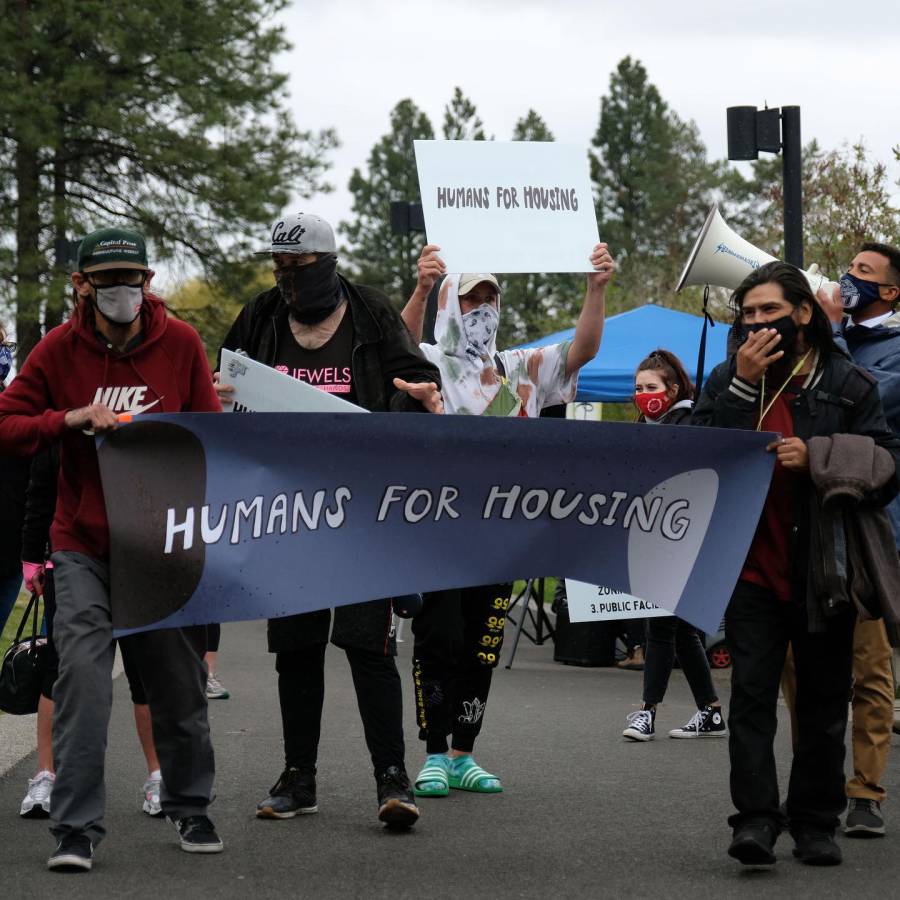
How can we create real change today under a capitalist economy that literally tries to sweep the problem out of sight? Mass organizing uniting tenants, homeowners and homeless people and their advocates to demand truly affordable housing, tenant rights, no evictions or foreclosures and an end to sweeps and discriminatory policing of homeless people.
Jude Wagner contributed to this article.



